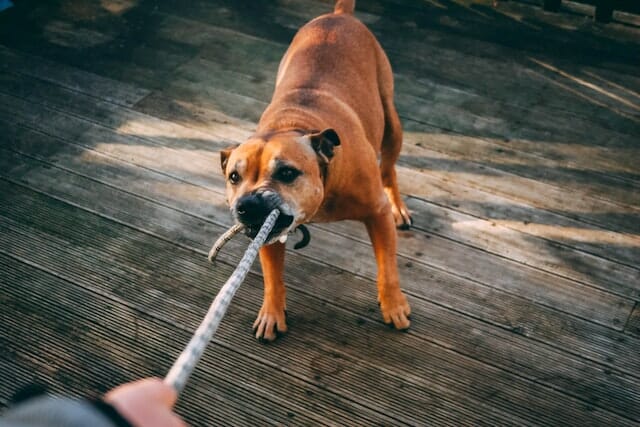A Comprehensive Guide: 7 Common Boxer Dog Behavior Problems


Welcome to the fascinating world of Boxer dogs!
These lovable, energetic canines are known for their playful nature and boundless enthusiasm.
However, like any breed, Boxers can develop behavior problems that may leave owners scratching their heads.
In this article, we’ll delve into the characteristics and traits of Boxer dogs, explore common behavior issues, pinpoint their causes, and provide valuable tips for preventing and managing these problems.
So, let’s embark on this journey of understanding and nurturing your Boxer’s behavior!
Characteristics and Traits of Boxer Dogs
Boxer dogs are indeed a unique and captivating breed, known for a multitude of characteristics and traits that set them apart from other canine companions.
Let’s delve deeper into these characteristics and explore the complexities that make Boxers so special:
Energetic and athletic
Boxers are like perpetual motion machines, brimming with boundless energy.
They have a natural athleticism that makes them excel in various physical activities, from agility training to playing fetch.
Their tireless enthusiasm can be infectious, encouraging their owners to stay active and engaged.
Affectionate and loyal
Boxers have a heartwarming affectionate nature.
They form deep bonds with their human families and are often described as “Velcro dogs” because they like to stick close to their owners.
Their unwavering loyalty means they’ll always be there to offer comfort and companionship.
Intelligent and eager to learn
Intelligence is a hallmark trait of Boxer dogs.
Their sharp minds and quick thinking make them eager learners.
They thrive in obedience training and are known for their ability to grasp new commands rapidly.
This intelligence also translates into problem-solving skills, which can sometimes lead to amusing antics.

Protective instincts
Boxers have a strong protective instinct, making them excellent guard dogs.
They are naturally attuned to their surroundings and will often act as vigilant protectors of their families.
This protective nature, coupled with their courage, means they are willing to defend their loved ones when necessary.
Playful and youthful
Boxers maintain a youthful exuberance throughout their lives.
Their playful personalities make them eternal puppies at heart.
They often engage in playtime with a zest for life that can bring endless joy and laughter to your household.
Their playfulness also extends to interacting with children, making them great family pets.
Expressive faces
Boxers are known for their expressive faces, with soulful eyes and a distinctive, somewhat wrinkled forehead.
Their facial expressions can convey a wide range of emotions, making it easy for owners to understand their feelings and needs.
Social butterflies
Boxers are highly social animals.
They thrive on human interaction and can become stressed or anxious if left alone for extended periods.
They are happiest when they are an integral part of the family, sharing in their daily activities and receiving the attention and love they crave.
Common Boxer Dog Behavior Problems
Boxer dogs, like any breed, can exhibit behavior problems that may require attention and training. Let’s explore some common behavior problems in more detail:
Jumping
Boxers are exuberant and energetic, which can lead to a jumping habit.
This behavior can be problematic when they leap on people or furniture.
To address this issue, consistent training is essential.
Teaching your Boxer the “off” command and rewarding them for keeping all four paws on the ground can help curb this behavior.
Ignoring them when they jump and only offering attention when they are calm can also be effective.
Chewing
Boxers have strong jaws and a natural inclination to chew, especially when they are teething.
To prevent destructive chewing, provide them with plenty of appropriate chew toys and supervise them during playtime.
Crate training can also help when you’re not around to supervise, ensuring they don’t develop a taste for furniture or other household items.
Barking
Boxers are vocal dogs, and they may bark to communicate or alert you to something.
Excessive barking can be a concern, especially if it disturbs neighbors.
Training your Boxer to respond to a “quiet” or “enough” command can be helpful.
Identifying the triggers for their barking and addressing those issues can also reduce unnecessary noise.

Separation anxiety
Boxers form strong attachments to their owners and can experience separation anxiety when left alone for extended periods.
To alleviate this anxiety, gradually acclimate your Boxer to being alone by starting with short departures and gradually increasing the time.
Providing engaging toys and creating a safe and comfortable space can also help them feel secure when you’re not at home.
Aggression
While Boxers are typically friendly, they can display aggression if not properly socialized and trained.
Early socialization with other dogs and people is crucial to prevent aggressive behavior.
Consistent, positive reinforcement-based training is essential to teach them appropriate behavior and control.
If you notice signs of aggression, consult a professional dog trainer or behaviorist for guidance.
Digging
Some Boxers have a penchant for digging, which can be frustrating for garden-loving owners.
To address this behavior, provide a designated digging area filled with loose soil or sand. Encourage them to dig there and reward them for using that space.
Additionally, increasing exercise and mental stimulation can help reduce the urge to dig out of boredom.
Food Guarding
Boxers can be possessive of their food or toys, leading to resource-guarding behavior.
To address this issue, practice food or toy exchanges, gradually teaching your Boxer that giving up possessions results in positive outcomes.
Always approach these situations cautiously to ensure safety.
What Causes Behavior Problems in Boxers
Understanding the root causes of behavior problems is essential for addressing them effectively. Several factors contribute to behavior issues in Boxer dogs:
- Lack of socialization: Inadequate exposure to new people, animals, and environments during puppyhood can lead to fear and aggression later in life.
- Insufficient exercise: Boxers require plenty of physical and mental stimulation. Without it, they may become bored and engage in undesirable behaviors.
- Inadequate training: A lack of proper training and consistency can result in disobedience and other behavioral problems.
- Genetics: Some behavior problems may have a genetic component, so it’s essential to research a puppy’s lineage when getting a Boxer.
Tips for Preventing Boxer Behavior Problems
Early Socialization: Begin socializing your Boxer puppy as early as possible.
Expose them to various people, animals, and environments to build their confidence and reduce the likelihood of fear or aggression issues later in life.
Puppy socialization classes can be a great way to achieve this in a controlled and positive environment.
Consistent training
Consistency is key when training Boxers. Use positive reinforcement methods, such as treats, praise, and toys, to reward good behavior.
Be patient and clear in your commands. Consistency in your training approach helps your Boxers understand what is expected of them.
Adequate exercise
Boxers are energetic dogs that need a substantial amount of physical exercise to stay happy and well-behaved.
Provide daily walks, runs, or playtime in a secure area like a fenced yard. Interactive toys like fetch or tug-of-war can also help burn off excess energy.
Mental stimulation
In addition to physical exercise, engage your Boxer’s mind.
Puzzle toys, interactive feeders, and obedience training sessions can challenge their intellect and prevent boredom.
A mentally stimulated Boxer is less likely to engage in destructive behaviors.
Routine and structure
Establishing a daily routine provides stability and structure for your Boxer.
Consistent mealtimes, potty breaks, and exercise routines help them know what to expect, reducing anxiety and promoting good behavior. Boxers thrive in a well-structured environment.
Proper socialization with other dogs
Ensure that your Boxer interacts with other dogs in a positive and controlled manner.
This helps them learn appropriate social skills and prevents aggressive behavior towards other dogs.
Dog parks and supervised playdates can be beneficial for socialization.

Supervise and secure your home
Puppy-proof your home by removing potential hazards and keeping dangerous items out of reach.
Supervise your Boxer, especially when they are young, to prevent undesirable behaviors and accidents.
Positive reinforcement for handling
Get your Boxer accustomed to being handled, including grooming, nail trimming, and ear cleaning, from a young age. Use positive reinforcement and treats to make these experiences positive and stress-free.
Regular veterinary care
Ensure your Boxer receives regular check-ups and vaccinations. Address any health issues promptly, as pain or discomfort can lead to behavioral changes.
Patience and consistency
Finally, be patient with your Boxer. Behavior problems can take time to resolve. Consistency in your training and care routines is essential for long-term success.
Conclusion
Boxer dogs are truly exceptional companions, known for their distinctive traits and personalities.
Although they might encounter some behavior challenges, these can be successfully navigated through early socialization, consistent training, plenty of exercise, and mental engagement.
By comprehending their unique needs and proactively addressing any potential issues, you can establish a joyful and harmonious bond with your Boxer.
FAQs
Yes, Boxers are excellent family dogs known for their affectionate and protective nature.
While Boxers can adapt to apartment living with enough exercise, they thrive in homes with access to a yard for play.
Boxers can get along with other pets, especially when socialized from an early age. However, individual temperament varies.
Training commands like “sit” and “down” can help control jumping behavior. Consistency in reinforcement is key.
Yes, Boxers shed moderately year-round. Regular grooming can help manage their shedding.



